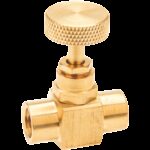Modern fluid systems require high accuracy, reliability, and safety. The NPT brass needle valve is a critical component that ensures precise control of liquids and gases. Its compact and durable design allows operators to fine-tune flow rates, making it ideal for industrial, laboratory, HVAC, plumbing, and instrumentation applications.
Integrating NPT brass needle valves with complementary components like actuators, strainers, and instrumentation creates efficient, safe, and high-performing systems. These valves provide smooth, consistent operation, minimize the risk of leaks, and allow easy maintenance. When combined with other fluid control products, they help maintain system reliability and reduce operational costs.
- NPT Brass Needle Valve: Definition and Function
A NPT brass needle valve is a type of precision valve designed for controlling flow through small orifices. “NPT” refers to National Pipe Thread, a standardized threading system that ensures secure, leak-free connections in pipelines.
The valve’s needle-shaped plunger allows gradual throttling of fluids, providing fine control over flow rates. Its brass construction makes it corrosion-resistant and durable, suitable for water, air, gases, and industrial chemicals. These valves are used in laboratories, instrumentation systems, HVAC pipelines, and industrial plants where accurate flow control is essential.
The main advantage of needle valves is their ability to precisely adjust the flow, which is difficult to achieve with standard ball or gate valves. This makes them ideal for sensitive applications such as chemical dosing, instrumentation, or high-precision laboratory experiments.
- Actuators: Automating Precision Control
Actuators play a key role in enhancing the functionality of NPT brass needle valves. By automating valve operation, electric, pneumatic, or hydraulic actuators allow precise remote control of flow without manual intervention.
Automation ensures repeatable performance and minimizes human error. For example, in industrial manufacturing or chemical processing, actuator-controlled needle valves maintain consistent flow, improving product quality and process safety. Additionally, actuators allow integration with control systems for remote monitoring, enabling operators to adjust parameters in real-time.
When combined with needle valves, actuators optimize operational efficiency, reduce downtime, and provide precise flow adjustments even in complex or hazardous environments.
- Strainers: Ensuring Smooth System Operation
Debris and contaminants in fluid systems can damage valves and downstream equipment. Strainers act as protective filters, removing particles from the fluid stream.
When paired with NPT brass needle valves, strainers prevent blockages, maintain flow quality, and extend the service life of valves and other components. This is especially important in industrial applications, water treatment plants, and HVAC systems, where uninterrupted flow is crucial.
By maintaining clean fluid pathways, strainers reduce maintenance frequency, prevent costly repairs, and ensure that needle valves continue to operate with precision.
- Instrumentation: Monitoring for Accuracy
Instrumentation components complement needle valves by providing real-time monitoring of system conditions. Pressure gauges, pressure transmitters, and thermometers help operators track flow, pressure, and temperature, ensuring that systems operate within safe and optimal parameters.
When integrated with NPT brass needle valves, instrumentation enables operators to make data-driven adjustments for precise flow control. This is critical in laboratory experiments, industrial chemical dosing, HVAC systems, and waterworks applications. Continuous monitoring also supports predictive maintenance, preventing unexpected failures and improving overall system reliability.
- Applications Across Industries
The versatility of NPT brass needle valves allows them to serve multiple industries effectively:
- Industrial Manufacturing: Precisely controls liquids and gases in production lines.
- Waterworks and Plumbing: Ensures safe, reliable flow management in pipelines.
- HVAC Systems: Provides fine control over heating and cooling fluids.
- Laboratories and Instrumentation: Facilitates accurate measurement and testing.
- Fire Protection Systems: Manages water flow in safety-critical applications.
Their compact design and precise flow control make needle valves suitable for both low- and high-pressure systems. Additionally, their brass construction ensures durability even in harsh environments, making them a long-term, cost-effective solution.
Integration and Benefits
Integrating NPT brass needle valves into a fluid system provides several advantages:
- Precise flow regulation for sensitive applications.
- Durable, corrosion-resistant brass construction.
- Seamless integration with actuators, strainers, and instrumentation.
- Reduced maintenance and operational disruptions.
- Versatility across industrial, HVAC, plumbing, and laboratory applications.
These benefits enhance overall system efficiency, improve safety, and support smooth operations. By combining needle valves with supporting components, operators can build a fully optimized fluid control system.
Conclusion: Reliable Solutions with Lehigh Valley Valve
The NPT brass needle valve is an essential tool for precise and reliable fluid control. Its compact design, durability, and fine-flow regulation capabilities make it suitable for a wide range of applications, from industrial manufacturing to HVAC, waterworks, and laboratory systems.
Lehigh Valley Valve offers a comprehensive range of NPT brass needle valves, along with actuators, strainers, and instrumentation. Their solutions ensure seamless integration and optimized performance across complex fluid systems. Partnering with Lehigh Valley Valve allows businesses to maintain operational precision, enhance safety, and achieve long-term reliability, making them a trusted provider in the field of fluid control solutions.

